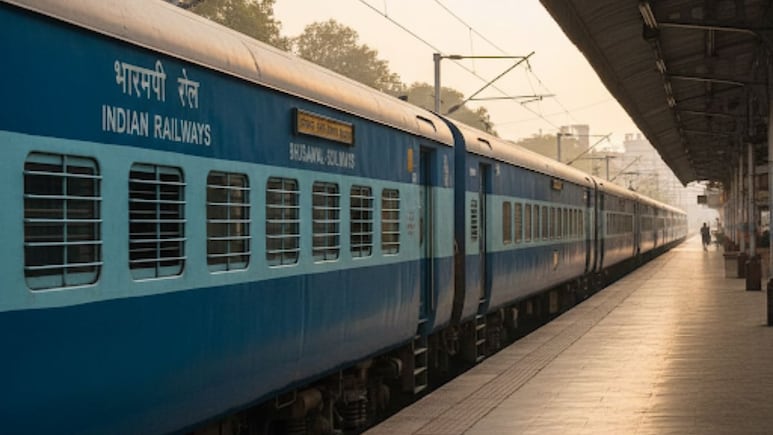
- Indian Railways will allow free online travel date changes for confirmed tickets from January
- Passengers pay only fare difference if seats are available, no cancellation fee applies
- Rebooking flexibility aids travel during delays, emergencies, and last-minute plan changes
In a move that could make India's most popular travel mode far more flexible, Indian Railways will introduce a new policy allowing passengers to change the travel date of their confirmed train tickets online without any fee. Instead of losing money on cancellations, starting January, passengers can simply rebook another train, paying only the fare difference, if any, as long as seats are available. It might sound like a small tweak, but for the millions of Indians who rely on trains for everything from work trips to weddings, this change could be quite beneficial.
Challenges Under The Current Railway Ticket Booking System
For years, missing a train meant not just frustration but also losing money. Under the old system, cancelling a confirmed ticket could cost 25 per cent deduction from the fare or even more, depending on the class and timing.
Rashi Goel, a 29-year-old consultant who travels between Mumbai and Ahmedabad every fortnight, says this update could finally give her breathing space. “I have missed trains simply because meetings got extended. Earlier, that meant losing both money and time. Rebooking will be a big relief,” she says.
Others echo the sentiment. “I had to cancel my trip home when my aunt fell sick. This change will save money spent on cancellation fees,” says Kartik Kumar, a Delhi-based traveller.
These stories underline how the new policy in works could ease travel stress — especially for people whose plans often shift at the last minute.
Also Read: This Is The Only Train In India Where You Never Have To Pay For Your Meals
Before vs After: The Pain Points That May Finally Get Fixed
| Situation | Before | Now |
| Meeting delayed, missed train | Cancel and rebook, pay fee | Rebook instantly, no fee |
| Family emergency | Cancellation penalty up to 25% deduction | No penalty, only pay fare difference |
| Flight delay connecting to train | Lose full amount if window closed | Rebook next available train |
| Last-minute plan change | Risk of full loss | Retain ticket value |
The rebooking option reduces both cost and friction. It is especially useful in a country where unpredictable weather, work commitments, and large family gatherings often throw plans off course.
How Flexibility In Changing Train Ticket Date Can Help
This is not just a technical update — it is a practical one. Here are the top moments when rebooking could save your trip (and your wallet):
Monsoon delays: When flights, roads or local trains run late.
Festivals: When family gatherings or weddings stretch a few days longer.
Work emergencies: When a meeting suddenly shifts or extends.
Health issues: When you cannot travel as planned.
Weather alerts or strikes: When travelling becomes uncertain.
Rail vs Airlines vs Buses: Who Wins On Flexibility?
Compared to airlines and buses, Indian Railways just gained a significant edge:
| Mode | Rebooking Flexibility | Typical Fee | Hassle Level |
| Trains | High (after policy implementation) | ₹0 (only fare difference) | Moderate |
| Airlines | Medium | ₹2,000-₹4,000 | High |
| Buses | Depends on operator | ₹100-₹500 | Low-Medium |
For a country that depends on trains for both short and long-distance travel, this kind of flexibility can make railways one of the most traveller-friendly transport systems - especially for budget travellers.
Flexibility In Rail Systems Around The World
Many developed rail systems already operate on flexible ticketing models.
In Japan, travellers with a Japan Rail Pass can hop on most trains without being restricted to a single fixed itinerary.
In Europe, when you buy a ticket that is called a flexible fare, it will be refundable, exchangeable, or valid for travel on other trains. So, if your plans change, be they timeframe ones or destination ones, you won't lose out completely.
In the UK, anytime tickets allow travel on any train service within the validity period (usually the day of travel, or up to five days for a return) without time restrictions, making them suitable for uncertain plans.
India's new policy in works is simpler, more affordable, and aimed at the masses. The change brings Indian Railways one step closer to global travel norms.
Also Read: How To Book Tatkal Train Tickets In India Without Losing Your Seat In Two Minutes
Flexibility Means Easy Travel And More Exploration
The rebooking rule could also boost local tourism. Offbeat towns like Orchha, Gokarna, or Madgaon might see more travellers willing to take spontaneous detours now that changing plans will not cost extra.
For a country where millions travel by rail every day, even small policy tweaks can change how people move and how they see their own country.
Track Latest News Live on NDTV.com and get news updates from India and around the world

